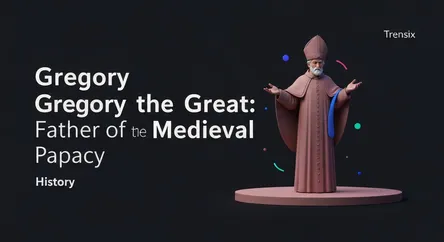History
Gregory the Great: Father of the Medieval Papacy

An overview of Pope Gregory I, one of the most influential figures in the Catholic Church, known for his vast writings and administrative reforms.
What is it?
Saint Gregory I, known as Gregory the Great, was the pope from 590 to 604 AD and is considered the founder of the medieval papacy. Before becoming pope, he was the prefect of Rome and later a Benedictine monk, making him the first pope from a monastic background. His papacy was marked by significant administrative and liturgical reforms. He was a prolific writer whose works, like "Pastoral Care," guided bishops for centuries. One of his most notable achievements was initiating the Gregorian Mission, which sent Augustine of Canterbury to convert the Anglo-Saxons in England to Christianity. He also solidified papal authority and managed the vast landholdings of the church, using the revenue to care for the poor and ransom prisoners.
Why is it trending?
Gregory the Great remains a figure of interest due to his profound and lasting impact on the structure and doctrine of the Western Church. He is one of only four popes to be officially styled "the Great" and is recognized as one of the four great Latin Fathers of the Church. His name is famously associated with Gregorian Chant, a form of liturgical music, highlighting his influence on worship. His emphasis on humility, famously coining the papal title "servant of the servants of God," continues to be a reference point for church leadership today. His blend of spiritual authority with practical, charitable governance makes his pontificate a subject of ongoing historical and theological study.
How does it affect people?
Gregory's influence is still felt today. His work shaped the medieval papacy, transforming it into a major spiritual and temporal power that would define Europe for centuries. The successful conversion of England laid the groundwork for a major center of Christianity in the English-speaking world. His liturgical reforms helped standardize practices within the Mass that persist in the Roman Catholic tradition. His writings helped articulate key doctrines, such as the concept of Purgatory, and his administrative prowess created a model for church governance. He is the patron saint of musicians, singers, students, and teachers, reflecting his broad and enduring legacy.